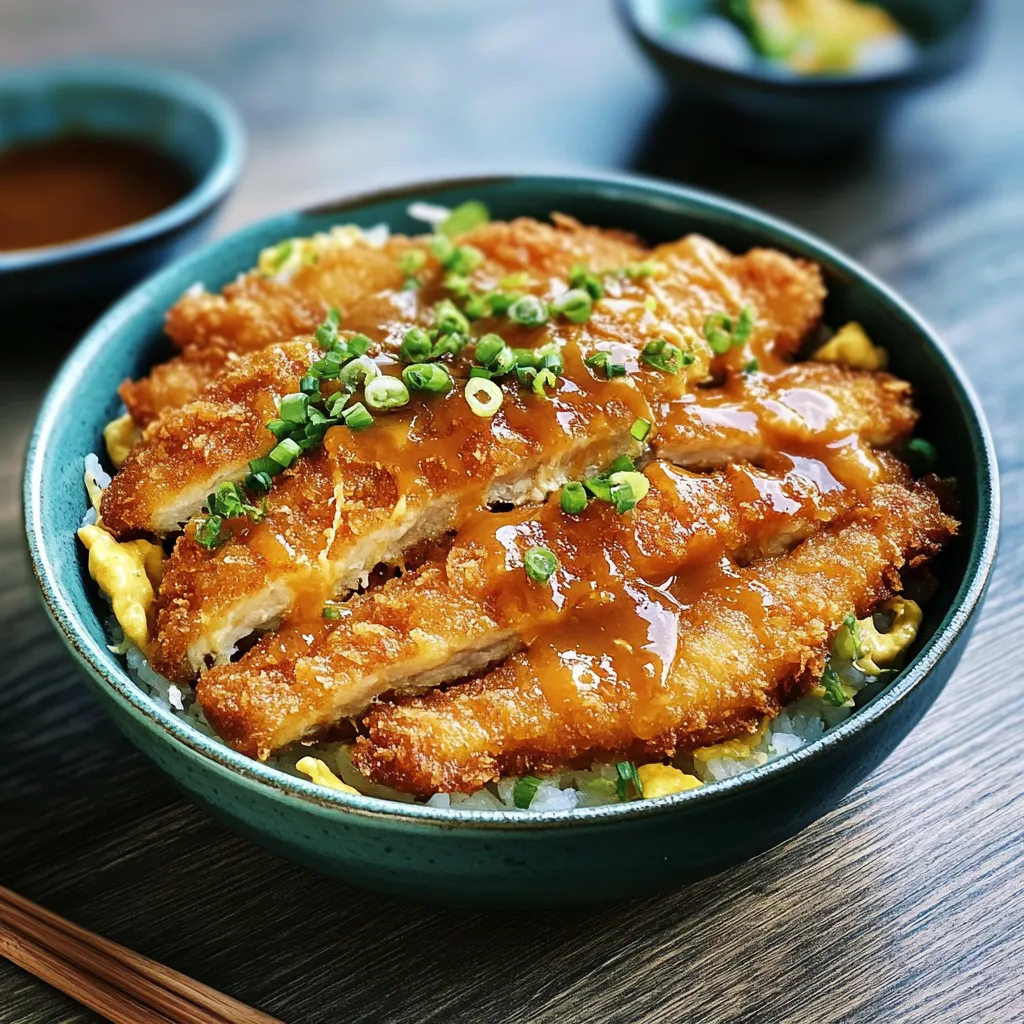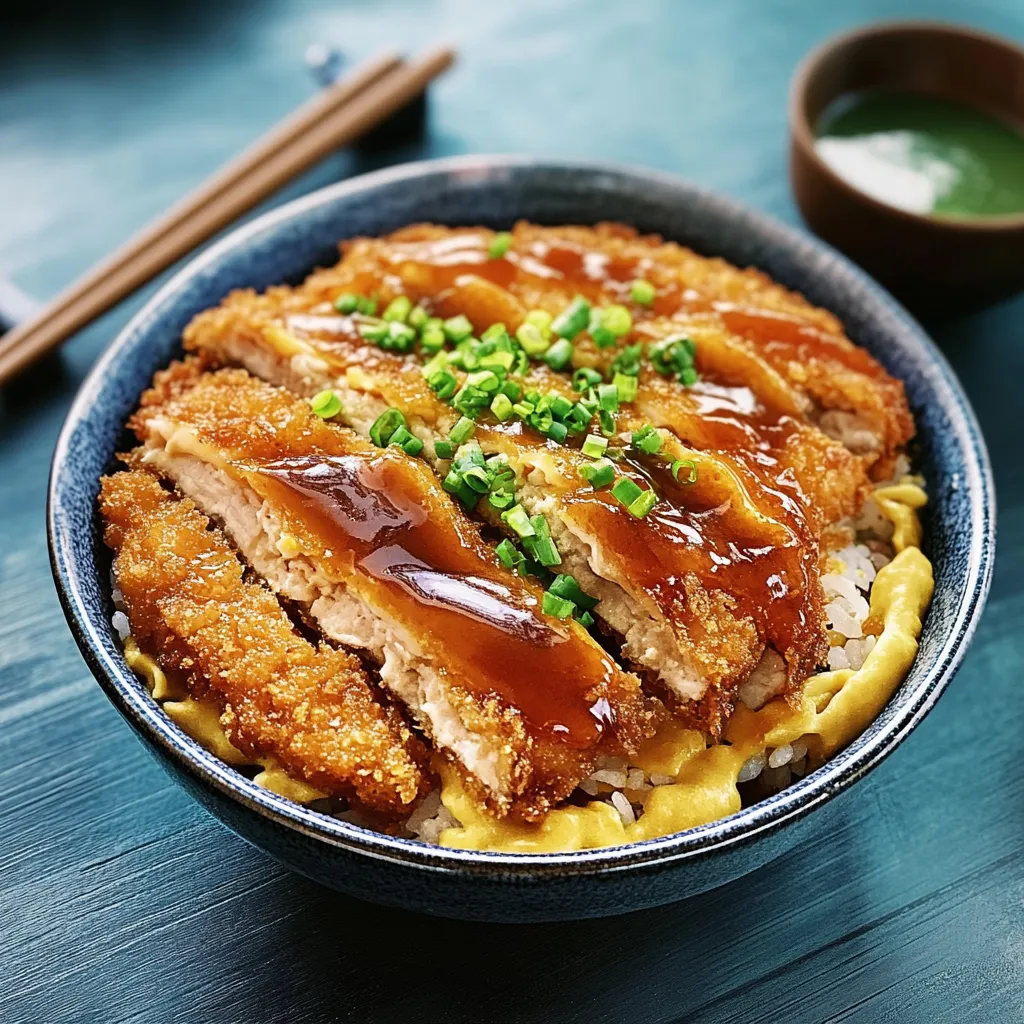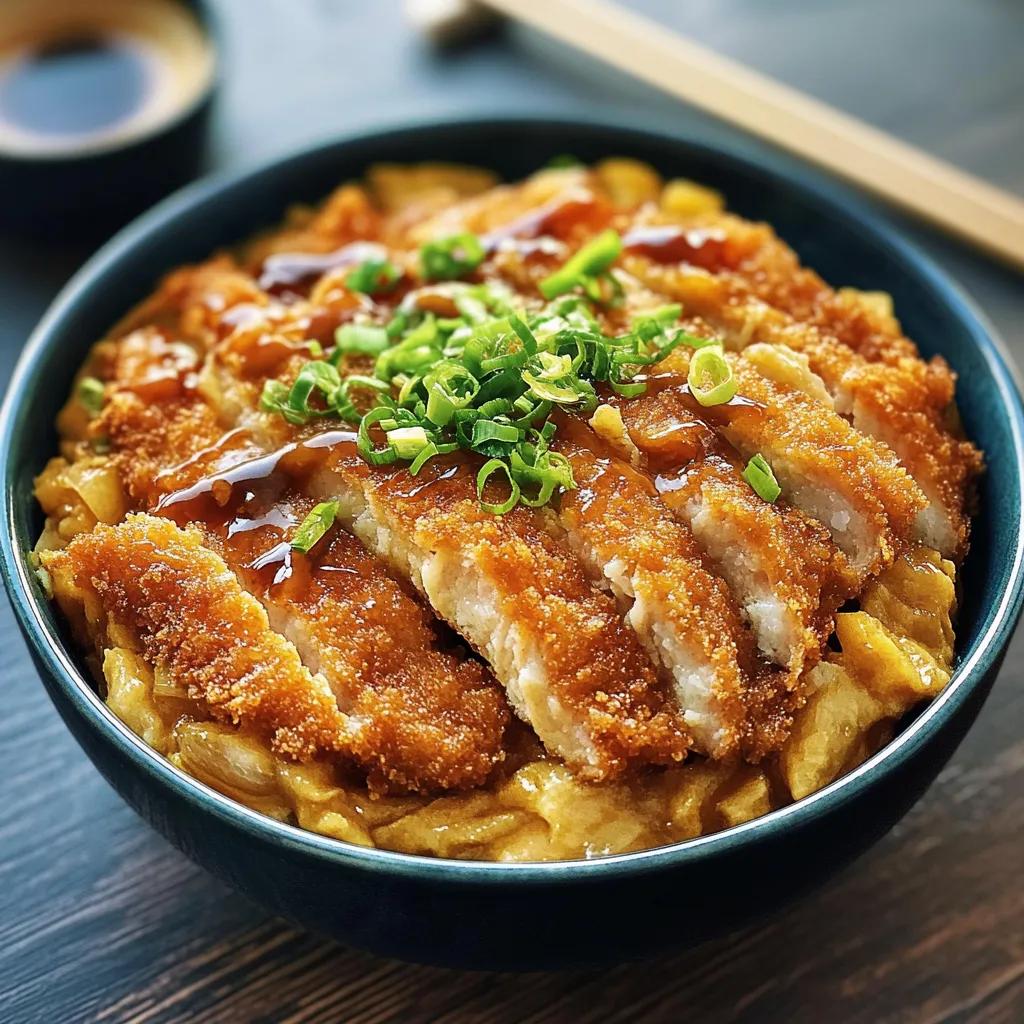 Pin it
Pin it
This hearty Japanese katsu bowl brings restaurant-quality comfort food right to your kitchen table. The crispy panko-coated cutlets paired with steaming rice and sweet-savory tonkatsu sauce create a meal that satisfies both the eye and palate.
I discovered katsu bowls during my college years when a Japanese roommate prepared this for our apartment dinner nights. The simplicity of the preparation combined with the incredible flavor contrast made it an instant favorite that I've been perfecting ever since.
Ingredients
- Chicken breasts or pork loin cutlets: Provides the perfect protein foundation with mild flavor that accepts the crispy coating beautifully
- Panko breadcrumbs: Creates that signature light and airy crunch that makes katsu special use Japanese brands for authentic texture
- All purpose flour: Essential for helping the egg and breadcrumbs adhere properly to create the perfect crispy coating
- Eggs: Acts as the glue between flour and panko creating that perfect crust that stays intact when sliced
- White rice: Preferably short grain sushi rice which has the perfect sticky texture to complement the crispy katsu
- Tonkatsu sauce: The sweet tangy sauce that defines authentic katsu bowls look for Bulldog brand for traditional flavor
- Frying oil: Choose a neutral oil with high smoke point vegetable or canola work perfectly for that golden crust
Step-by-Step Instructions
- Prepare the Protein:
- Season your pounded chicken or pork cutlets generously with salt and pepper. The thinness is crucial here about half inch thickness ensures quick cooking and tender meat. Take your time with this step as evenly pounded meat cooks more uniformly and creates a better presentation.
- Create Your Breading Station:
- Set up three separate shallow dishes in sequence. First bowl with flour seasoned with a pinch of salt. Second bowl with thoroughly beaten eggs. Third bowl with panko breadcrumbs spread evenly. This organization makes the breading process efficient and less messy.
- Bread the Cutlets:
- Dredge each cutlet completely in flour ensuring even coverage but shake off excess. Then fully immerse in egg mixture letting excess drip off. Finally coat thoroughly with panko pressing gently to adhere the breadcrumbs while maintaining their light texture. Set aside on a plate while you finish breading all pieces.
- Fry to Golden Perfection:
- Heat oil to exactly 350°F for optimal crispiness without burning. A kitchen thermometer is invaluable here. Gently place breaded cutlets into hot oil without overcrowding the pan. Fry chicken for 3 to 4 minutes per side until deeply golden and internal temperature reaches 165°F. For pork cook 2 to 3 minutes per side until golden and temperature reaches 145°F.
- Rest and Slice:
- Allow fried cutlets to rest on paper towels for 2 minutes to drain excess oil. This resting period helps maintain crispiness when serving. Slice cutlets into strips about half inch wide across the grain for tenderness.
- Prepare Homemade Sauce:
- If making sauce from scratch whisk together ketchup Worcestershire sauce soy sauce and sugar until completely smooth. Adjust sweetness by adding tiny amounts of extra sugar if needed. The sauce should have balanced sweet tangy and savory notes.
- Assemble Your Bowls:
- Place a generous portion of warm rice in each bowl. Arrange sliced katsu over the rice slightly fanned out. Drizzle tonkatsu sauce generously over the cutlets allowing some to seep into the rice. Garnish with finely chopped green onions or parsley for color and freshness.
 Pin it
Pin it
The first time I served these katsu bowls at a family gathering my Japanese friend's grandmother nodded in approval something I consider the highest compliment. She taught me that the quality of the panko makes all the difference and to always let the cutlets rest briefly before slicing to maintain the perfect crispiness.
Making Perfect Tonkatsu Sauce
While store bought options like Bull Dog brand are excellent making your own sauce allows complete flavor control. The balance of sweet tangy and umami flavors is what makes tonkatsu sauce special. Some families have closely guarded recipes with secret ingredients like grated apple or oyster sauce. Start with the basic recipe provided and adjust to your preference adding small amounts of honey for sweetness or a dash of garlic powder for depth.
The Art of Perfect Panko Coating
Japanese panko breadcrumbs differ significantly from Western style breadcrumbs. They're made from crustless bread that's processed into airy flakes rather than ground into fine crumbs. This structure creates a lighter coating that absorbs less oil resulting in the signature crispy yet light texture of katsu. When coating your cutlets avoid pressing too firmly which can compact the panko. Instead gently press just enough for adhesion while maintaining their airy structure.
Serving Variations
Traditional katsu bowls focus on simplicity but modern variations offer delicious alternatives. Create a katsudon by topping the rice with katsu simmered briefly in a mixture of dashi soy sauce mirin and onions with a soft egg. For a healthier option serve with shredded cabbage cucumber pickles and brown rice. A curry katsu transforms the dish by replacing tonkatsu sauce with Japanese curry roux poured over the rice and crispy cutlet.
 Pin it
Pin it
This recipe brings authentic flavors right into your home while being perfectly customizable for every occasion.
Frequently Asked Questions
- → Can I bake the katsu instead of frying?
Yes! For a lighter version, spray the breaded cutlets with cooking oil and bake at 400°F (200°C) for 15-20 minutes, flipping halfway through. While the texture won't be quite as crispy as traditional fried katsu, it's still delicious and healthier.
- → What's the difference between tonkatsu and katsu?
Tonkatsu specifically refers to breaded, fried pork cutlets ("ton" means pork in Japanese), while katsu is the broader term for the breading technique that can be applied to chicken (chicken katsu), beef, or other proteins.
- → What sides go well with katsu bowls?
Traditional accompaniments include shredded cabbage salad, miso soup, Japanese pickles (tsukemono), or a simple cucumber salad. For a complete meal, you might also add steamed or roasted vegetables like broccoli or carrots.
- → How can I tell when the katsu is cooked through?
The exterior should be golden brown and crispy. For chicken, ensure the internal temperature reaches 165°F (74°C), and for pork, 145°F (63°C). If you don't have a thermometer, you can make a small cut in the thickest part to check that there's no pink remaining.
- → Can I make the tonkatsu sauce ahead of time?
Absolutely! Homemade tonkatsu sauce can be stored in an airtight container in the refrigerator for up to 2 weeks. The flavors actually develop and improve after a day or two, making it ideal for meal prep.
- → What type of rice works best for katsu bowls?
Short-grain Japanese rice or sushi rice is traditional as it has the perfect sticky texture. Medium-grain rice is a good alternative. Long-grain rice works too, though the authentic experience comes from the slightly sticky consistency of Japanese-style rice.
